#maybe it’s just me being fed up with the past instances of what we commonly and endearingly refer to as
Explore tagged Tumblr posts
Text
you know, it’s not the fact that these characters aren’t explicitly expressed as queer and in love, it’s the fact that there are people who expect us not to imagine them that way, and find it absurd when we do. i think at this point, in this day and age, as a movie maker/a writer etc) it’s difficult to pretend you don’t see gay subtext, or that certain acting choices are coincidental/mistaken. or even just that there isn’t an inordinate amount of potential being wasted because it’s taboo to have two female mcs openly be each others explicitly romantic love interests.
Please don’t get me wrong, these two have a beautiful love story whether or not they end up together (romantically or otherwise) but the idea that they “weren’t meant to be interpreted that way” is such bullshit. i’m over producers and the like pretending they don’t know what audiences want to see, and they don’t know how we got here. they allow for these boundary crossings and innuendos, i’m almost 100% certain they have even *set them up*. and then they act like nothing is happening. ignore and brush off queer communities looking for validation & representation.
even post production, the way their stars are meant to act and speak to the press. the acting doesn’t stop when the movie’s done being filmed. yes, we love to see a deep and intimate relationship, a true bond formed between costars, a friendship like the one we see on screen, it makes everything we watch that much better. but it really is so disheartening to see actors play into traits and tropes of two people head over heels in love with each other with no intention of providing a movie featuring two people head over heels in love with each other.
just two women, inexplicably and irrevocably attracted to, enamored with, enlightened by one another. two women were going to change each others lives from the day they met.
two best friends in a room.
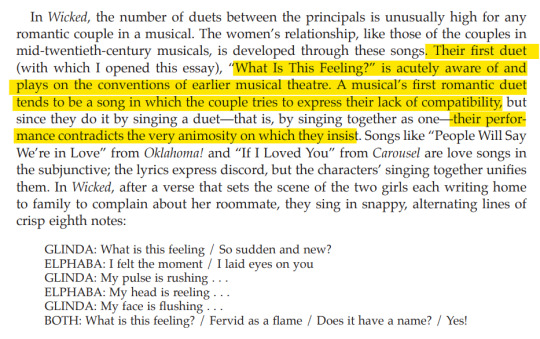
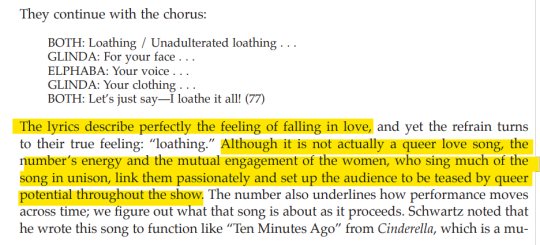
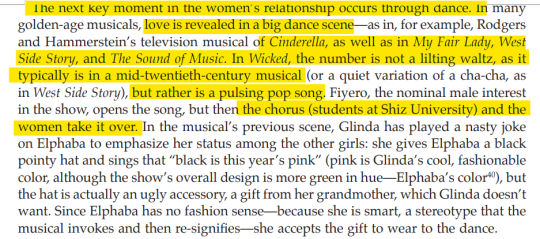
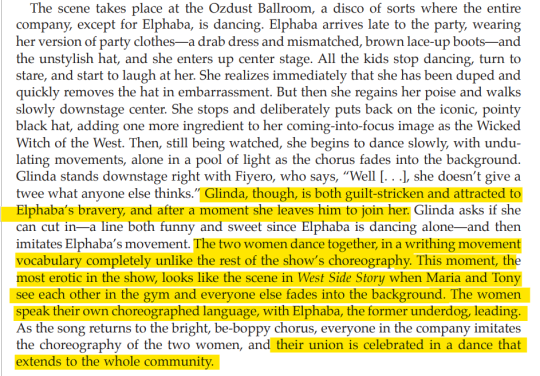

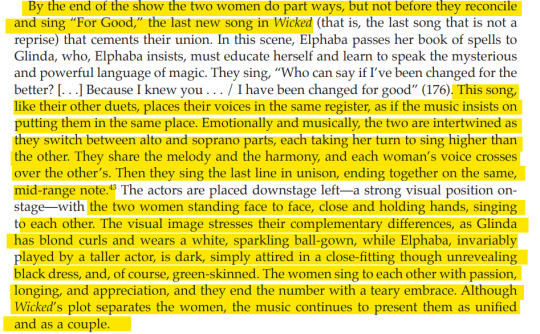
Defying Gravity: Queer Conventions in the Musical Wicked
#maybe it’s just me being fed up with the past instances of what we commonly and endearingly refer to as#queerbait#but why can’t the gay option be on the list#y’know?#like why is that so strange#so unheard of#why are we the secondary#why is it straight or inexplicable? why can’t it be perfectly explainable by the rules of attraction#why can’t they say it#why does it always have ti be something ignored until we won’t shut up about it and then at that point something that’s#up for interpretation#why does it have to be assumed that all characters are straight why can’t their sexuality be irrelevant#until proven to be otherwise (but there’s no form of ‘proof’ we could provide that would be convincing enough)#gelphie#wicked#they might kiss…..#oh my gahd#they were roommates
1K notes
·
View notes
Note
What do you mean by ridiculous names ? Is there puns or the name very unusual with fancy kanji/unusual readings for them ?
All of the above. Using older kanji makes sense since the story is set in Taishou, but most names are either unsubtle puns or relatively direct descriptors of the characters, like Gyokko meaning “jade vase”. Unusual readings don’t often all that often, but a great example is 不死川 being spelled as Shinazugawa instead of the more obvious Fujigawa (same kanji as Killer Killer’s Fujigawa btw).
Not only that, but there also a few examples of names that are straight up regular words with no twist to them whatsoever: Muzan (cruelty), Giyuu (heroism) and Agatsuma (my wife).
Kamado means “furnace gate”, because the Kamado family sells charcoal. It’s an outdated kanji for furnace (竃) to keep that Taishou flavor. Now, Tanjirou is a much more competent and interesting name, one of my favorites in the manga. Depending on whether you interpret its 治 as the 治 in 治す or the 治 in 退治, the meaning of his name could be either “healing son of charcoal” or “demon-slaying son of charcoal”, fitting perfectly with how Tanjirou’s goals involve both killing demons and getting a cure for his sister’s predicament. Not mention a lot of Heian mythology associating slaying oni with curing illness. And the charcoal part is because Tanjirou, of the Furnace family who sells charcoal, sells charcoal. By the did I mention Tanjirou sells charcoal? But anyways, there’s even another layer to this name and which it’s why it’s one of my favorites: it can be sort of a namefication of the verb 歎じる(tanjiru), which means to mourn, reflect Tanjirou’s main trait of sparing sympathy for pretty much every demon he kills.
Nezuko means “shrine bean girl”. Specifically Heian era shrines, so it’s maybe this kanji is too old even for the Taishou era (so old that a lot of people on the internet don’t know to type it or don’t bother the conversion takes too long). But it fits the character since Heian is when we got most of the oni related mythology this series is mostly about. The “bean girl” part is probably there only to sound cute.
Agatsuma, as mentioned earlier, means “my wife”. I already considered one of the funniest I’ve ever seen before I even started the manga and it only better after actually seeing Zen’itsu’s character. Zen’itsu has a cool double meaning like Tanjirou, with 逸 potentially being from 逸する or 逸物, so his name means either “goodness missed” or “goodness at its best”, which fits how Zen’itsu is normally an absolutely terrible person in every aspect but shows himself to be ultimately caring and competent when pushes come to the shove (even if through the power of stress napping most of the time).
Hashibira means “beak flattened”. A rare name I have no idea how it connects to the character. Inosuke’s kanji mean “helper of the elegant” but the intent is clearly a pun on inoshishi (boar). Besides, looking at the meaning feels like a moot point because everyone is “the elegant” compared to Inosuke.
Both Kanawo’s names are antiquated as heck, mainly there for the series Taishou era flavor. Tsuyuri is one of Japan’s most notoriously unusual ateji names (yeah, there are only 3 instances of the manga using real people names and one of them is the name known for being weird), with it’s kanji meaning “chestnut flower falling” and the kana means “rainy season starting”, because chestnut flowers fall in early May, signaling the start of the rainy season. Kanawo’s “birthday” is in May btw. Anyways, the name was probably chosen for her specifically because of flower kanji in the middle and her Breath of Flowers. Kanawo is a katakana name, so no proper meaning, but it overall feels very old because it’s a name that uses “wo” instead of “o”. Taishou flavor, as I mentioned.
I’m skipping Gen’ya to his brother’s section because their names are matching.
Ubuyashiki means “childbirth grounds”. Kagaya had 5 children so it checks. Besides, with their family curse, pretty much all the Ubuyashikis can do is give birth to the next generation as much as they can before they kick the bucket. Kagaya means “radiant!”. Yes, the exclamation mark is part of the name’s meaning. I’m sure it’s a name all pillar agree with.
Tomioka means “wealth hill” it’s a rare instance of a real people name in this series, so I assume it must a reference to some one, but I have no idea who. Giyuu, as already mentioned, is just the regular word for heroism. Military volunteers are actually called “giyuu soldiers” in Japanese even.
Similarly, Kochou is the regular word for butterfly (although not the most commonly used). Shinobu is a hiragana name, so no proper meaning (much like Kanae and Kanawo’s katakana names), but name Shinobu is normally written with 忍 (the shinobi kanji) or 偲 (remembering, but most often in the context of remembering a dead person). The latter has obvious meaning in Shinobu’s relationship with Kanae, but the former might also have an interesting meaning behind it. The shinobi kanji is made with the heart kanji under the blade kanji (insert Monogatari reference here), so a huge cliche in ninja-themed literature is the saying “a shinobi without a heart is just a blade” (surprisingly never mentioned once in Naruto, as far as I can remember). I believe this thematically connects to Shinobu’s central character trait of wanting to have Kanae’s kindness but not being able to bring herself to be that empathetic to demons. She tries to be Shinobu but can’t force herself to retain the heart she lost, so she ends up just being a blade.
Rengoku is the regular word for purgatory, as you probably know from it being also the name of his ninth kata. Kyoujurou means “congratulating son of apricorns”, with father Shinjurou being “congratulating son of yew plum pine” and his brother Senjurou being “congratulating son of thousand”. The pun here is probably with 享受(kyouju; happily accepting something) vs 信受 (shinju; accepting a fact, in a somewhat resignated way). Another possibility less related to the conflicted with his character is 教授(kyouju; professor) since he’s a mentor character.
Uzui means “roof marrow”, but real pun is with uzu uzu, the gitaigo for impatience, a character trait fitting for a character completely centered around rejecting shinobi philosophies. Also reflects how his very first sympathetic moment was him honestly admiting that his impatience to save his wives caused him to make a few bad moves. Tengen is the Japanese reading for Tianyuan, which is the heaven’s energy which composes everything according to some ancient Chinese traditions. You may have heard of it as the “celestial unknown” or the “heavenly element”. Don’t know what it has to do with Tengen’s character though.
Kanroji means “nectar temple” and Mitsuri means “honey lazuli”. The “temple” and “lazuli” part are kanji commonly used in names, so that’s a pretty much just thrown in there to make her name sound more like a name. The real keywords here nectar and honey, since those are two words that can be used as horny words in a very subtle way, but suddenly look a lot less subtle when they are about the Love Pillar.
Himejima means “scream island”, but specifically the sad, crying kind of scream, matching with how Himejima is pretty much always crying out of compassion for others. Also, archaic kanji for “island” because Taishou. Gyoumei means “carita afterlife”. Carita is an umbrella term for all forms of spiritual training in Buddhism. It includes a lot of things we see associated with him in the manga, like sitting under waterfalls, reciting chants, etc.
Tokitou means “time transparent”. Possibly a clever amnesia reference (in the sense of how his past time was invisible to him)? Muichirou means “first son of no”, in a ridiculous match with his twin Yuichirou (”first son of yes”). Yuichirou references that multiple times in his backstory, saying it’s supposed to mean “no worth” or “no point”, only to then say it’s supposed to mean “no limits” in the climax of the flashback.
Iguro means “elegant black”. It’s an obvious anagram on guroi (gorey). Now, Obanai is easily the most incomprehensible name in the series. It means “small banana inside”, which is nonsensical enough for me to know for sure there’s a hidden pun involved, but I can’t find it for the life of me. The closest I can get is a pun with the English word “overnight” (OBAaNAIto), but I still don’t know Iguro’s character enough to know what “overnight” has to do with him.
不死川 would mean “immortal river“ as Fujigawa, but due to ateji it be comes more like “river of not dying“. Like with Kanroji’s names, the river kanji is only there to make the name look more like a real name (note: it’s not working) and the “not dying“ part is what really matters. Sanemi is introduced showing off his chest covered in scars and having Kanroji commenting on how he’s got a new scar in his last mission, immediately conveying to the audience that he’s a dude that’s not dying despite injuring himself a lot. Now Sanemi is a much more complicated name because 実 has dozens of meanings and I had no way of knowing which one is supposed to apply to him until Gen’ya finally came into play. Looking at them as paired names, Sanemi means “more reality“ and Gen’ya means “more illusion“. Can’t say why Sanemi is supposed to represent truth or Gen’ya is supposed represent lies, though. Could be something about how Sanemi knows the truth about how he felt about his brother while was fed Sanemi’s lies in their reencounter, could be about how Sanemi is a true breath user while Gen’ya is a fraud who needs to rely on Breath of Gun or going Kirby on the demons to fight, who knows. On a semi-related note, all of their other siblings had generic unrelated names. I guess their parents didn’t think of going with “more half-truth“ or “more ommision“ names before dropping the naming pattern.
Kyougai means “echoing fanfare”. Two sound related words for the drum guy. Pretty basic.
Rui is a regular word for bad influence, fitting of how he forced others into his abusive family play. It’s written with the radical for thread, so I that’s one of the ones I find more clever than ridiculous.
Enmu, on the other hand, means “nightmare dream”. And if that wasn’t redundant enough, it’s also an anagram for nemu(sleep).
Kaigaku means “sly peaks”. The peaks part is common surname kanji, so only the “sly” part matters. Obvious traitor name, which must be why he was unnamed in Zen’itsu’s first flashback.
Nakime means “sounding woman”. Very self-explanatory, she’s a woman who plays a biwa.
Daki means “fallen princess”, which is already meaningful enough for her character, but more importantly, it sounds very close to Dakki, the Japanese for the Daji, a famous Chinese monster disguised as an imperial courtesan. Giyuutarou is a name used for courtesan assistants, as already explained in the manga itself. Daki’s human name Ume is plum.
Gyokko means “jade vase”, as I said in the intro paragraph. Competing hard with Nakime for the title of most to-the-poing name in the series.
Hantengu means “half tengu”, because his ability is to split in halves and the tengu is the youkai species he’s themed after. Kinda weird how all oni in Kimetsu are themed after classic Japanese monster but only Daki, Hantengu and Douma get to be named after the ones they represent, I wish that was done more often. Anyways, his emotion bodies all have the kanji for their respective emotion in their names.
Akaza has my favorite name in the series, which makes sense considering everything else about him is also great. His human name is Hakuji, meaning “lion-dog healer” (yes, same ji in Tanjirou, but “demon-slaying” can’t be considered as a possibility for him for obvious reasons). As explained during his backstory, he’s named after lion-dog statues often seen guarding temple entrances. He’s someone who is supposed to be there to protect others. The healer part of his name also fits with how his spent half of his human life nursing his loved ones. And then Muzan turned him into Akaza. Due to its outdated kanji, even Japanese fans find his name a bit hard to interpret, but Akaza is generally agreed to mean “castrated dog sitting on a pit”. Delightfully humialiating name with delicious irony. In the chapter “The Useless Lion-dog”, Muzan turns the lion-dog who failed to guard its two families into a castrated dog sitting on a pit. All his nobility was neutered and he was left sitting still in a pit as he has no home to guard. Before this becomes a full Akaza meta on how he’s a full anti-thesis of what Hakuji swore to be, let’s get back to talk about names. His wife Koyuki’s name mean “love snow”. The love part represents how she’s a love interest of Hakuji and the snow part reflects she always a snowflakes hairpin and how Akaza projects the image of a snowflake on the floor when he activates his compass ability.
Douma means “child exhausted”, fitting his childish nature, especially in how he’s portrayed as a child who still hasn’t developed empathy at the age of 20, and with how his backstory is all about him being exhausted by human emotions after listening to hours of worshippers narrating their own tragedies. But most importantly, he named after Doumahoushi aka Ashiya Douman, the mythological villain he’s themed after. I like how he’s the only oni themed after a human villain rather than an actual oni or youkai like all the rest, but he might be the one oni who understands humans the least.
Kokushibou means “black death pupils”. Pupils as in eye pupil, not students, of course. He has no students, but he sure has a lot of pupils. Also eyes are often used as symbol for envy, which is the main theme of his backstory. Lastly, his name is a pun on kokushibyou aka the black plague, the disease that killed the most people in the world, just like he’s the oni who killed the most people. The 3 Upper Moons all have pretty unironically good names, all things considered. His human family name means “successor country”, probably in reference to how his brother passed down his hinomaru (symbol of Japan, the country) earrings to his next generation all the way down to Tanjirou. His name Michikatsu means “rock winner”. The winner part is obvious but I don’t know the (outdated) rock kanji was picked. His brother is Yoriichi meaning “fated one”, which probably on feeds Kokushibou’s complex harder.
Lastly and most ridiculously, Muzan Kibutsuji. Kibutsuji means “demon dance road”. Yes, the oni kanji is right there on his name, same demon kanji as the demons everyone faces. And as mentioned in the opener, the name Muzan is literally just the regular word cruelty. I’m commenting stuff with a friend as I read and we semi-consistently refer to Muzan as Meanie Demonbroadway because that’s just how stupid his name is. I really love it. Thank you anon for this opportunity to talk about Meanie Demonbroadway in a public space.
300 notes
·
View notes